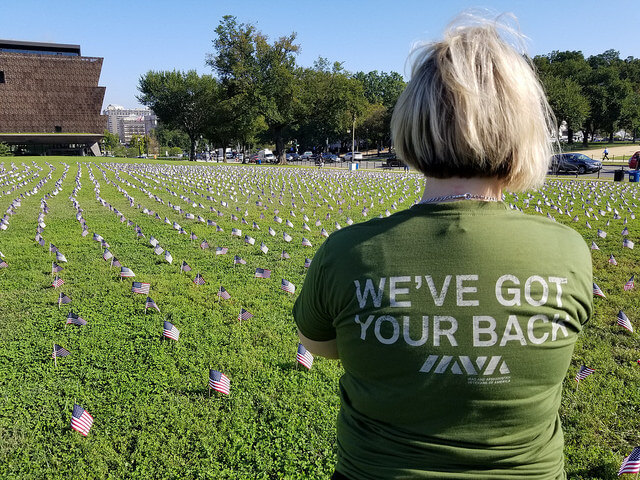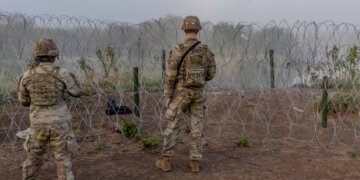It was a windy October morning with cloudy skies when iconic monuments of the National Mall in Washington, D.C. proudly looked over the grassy strip. Volunteers from Iraq and Afghanistan Veterans of America (IAVA) solemnly placed 5,520 American flags, each one symbolizing a veteran lost to suicide this year.

Twenty veterans on average commit suicide each day, according to a study by the Department of Veterans Affairs based on 55 million veterans’ records from 1979 to 2014. Research from 2018 reveals, “veterans with PTSD or depression are at increased risk for suicidal ideation.” In fact, a staggering 49 percent of veterans suffering from post-traumatic stress disorder consider committing suicide and the number is becoming increasingly higher within the Reserve and National Guard community.
The new generation of veterans have a voice.
Founded in 2004 by Paul Rieckhoff, an Iraq veteran, IAVA is a non-profit organization called by TIME Magazine, “the most important organization representing the new generation of veterans,” whose mission is to help veterans and their families. Through the years, they have connected over 1.2 million veterans with much-needed resources and united more than 400,000 veterans and allies nationwide. The secret to their success is based on their “member-focused organization,” says Tom Porter, IAVA Legislative Director and Navy reservist.
The group relies on their diverse members—who come from different political, cultural, ethnic, and social backgrounds—when it comes to understanding what veterans across the United States need.
For example, when IAVA surveyed their members this year, asking them if they were for or against the use of cannabis for veterans, 63 percent of them voted in favor, with an overwhelming 75 percent supporting its use in VA hospitals. Currently, a federal government policy prohibits VA physicians from referring patients to licensed and legally sanctioned state medical cannabis programs, including the 31 states that allow the use of medical marijuana. The policy further states that the use of cannabis is not permitted on VA property, even if it is medically prescribed.
Given the results of the survey, IAVA’s board members, led by Rieckhoff, knew they had to take action.
The #CannabisForVets campaign was launched this month with a call to action that states, “The federal government is making cannabis treatment for veterans hard to find. If they can handle weapons, explosives and ammunition, then they can handle medical cannabis. Demand change now.”
“It’s backward and harmful that regressive federal policies still ridiculously prohibit our veterans from having access to something that can lessen their pain, treat their symptoms, and improve their lives. IAVA members nationwide have spoken loudly and clearly. We need change now,” Rieckhoff said.
Why medical cannabis?
How can cannabis help veterans who suffer from PTSD and combat-related physical injuries? Cannabinoids, the psychoactive components of unrefined marijuana and other derivative products, contains chemicals that can be used for therapeutic reasons to treat a range of illnesses and symptoms, according to the National Institute on Drug Abuse. And advocates, including IAVA, are calling for more research to be done.
Dr. Jerid Fisher, a forensic neuropsychologist with over three decades of experience in brain injury rehabilitation, explains the use of cannabis on veterans suffering from PTSD, “shows promise. Think of the benefits it could have on a veteran suffering from chronic insomnia, for example.”
The consequences of chronic insomnia in a veteran’s day-to-day life range from irritability, mood swings, anxiety disorders, underperformance in the workplace—which could cause loss of job—physical or mental inability to be emotionally present within the family, thus leading to marital problems, and more. If left untreated, chronic insomnia can lead to life-threatening health conditions, such as diabetes, depression, hypertension, stroke, and heart failure.
He adds, “the use of cannabis affects neurotransmitters and induces feelings of pleasure and calmness, thus helping veterans who suffer from sleep disorders caused by PTSD. Clinically speaking, we know it potentially works for some people. The only question now remains: do the benefits of using cannabis outweigh the side effects? This answer to this question requires further well-controlled scientific studies. We need to understand exactly how it works, why it works, and what the right dosage might be, so that it doesn’t cause addiction. But this requires funds from the federal government, and we don’t have that yet.”
Congressional support
IAVA’s goal is to have the government pass their bipartisan bill VA Medicinal Cannabis Research Act of 2018. The bill would authorize “the Department of Veterans Affairs to conduct and support research on the efficacy and safety of certain forms of cannabis and cannabis delivery for veterans enrolled in the VA health care system diagnosed with conditions such as chronic pain or post-traumatic stress disorder (PTSD).”
“The bill has bipartisan support from Congress, including Senator Dan Sullivan (R-AK), Senator Jon Tester (D-MT), Representative Tim Walz (D-MN), Representative Phil Roe (R-TN) and more,” Porter explained.
And IAVA’s CEO sees this as a straightforward topic with one focus: “Our mission is to save lives.”
“The question of whether veterans should be allowed to use medical cannabis or not is a no brainer. This is a fight we feel very passionate about and we will not back down until our voices have been heard,” Rieckhoff said.








































